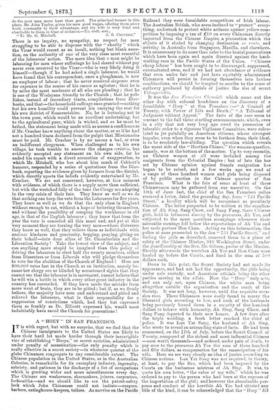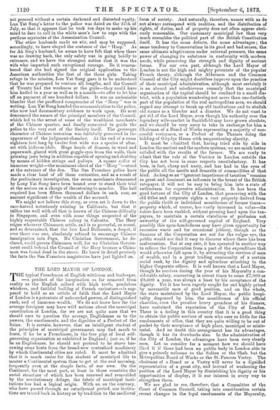A " HOEY " IN SAN FRANCISCO.
T is with regret, but with no surprise, that we find that the 1 Chinese immigrants to the United States are likely to have their hard lot made harder through their incorrigible vice of establishing " Hoeys," or secret societies, administered under penalty of assassination—the only penalty which is really effective in a secret society—in whatever quarter of the globe Chinamen congregate to any considerable extent. The Chinese population in the United States, as in the Australian Colonies, is remarkable for its exemplary industry, ingenuity, sobriety, and patience in the discharge of a list of occupations which is growing wider and more miscellaneous every day. The Chinese are washermen, shoemakers, joiners, carpenters, locksmiths—and we should like to see the patent-safety lock which John Chinaman could not imitate—coopers, barbers, eatinghouee-keepers, tailors. As navvies on the Pacific
Railroad they were formidable competitors of Irish labour. The Australian British, who seem inclined to protect" every- thing, undertook to protect white artisans against yellow com- petition by imposing a tax of £10 on every Chinaman directly There is no inquiry, no sympathy, no respect for men imported from the Chinese Empire, a precaution which the struggling to be able to dispense with the " charity " which objects of it eluded by changing destination en route, and arriving in Australia from Singapore, Manilla, and elsewhere. the Vicar would resent as an insult, nothing but blank asser- It is unnecessary to do more than refer to the brutal persecutions of the labourers' action. The mere idea that a man might be which have been again and again directed against the hard- labouring for men whose sufferings he had shared without pay working race in the Pacific States of the Union. "Chinese c never even occurred to the Vicar—who is very likely doing it cheap labour" has been sought to be discouraged, suppressed, e
himself—though if he had asked a single labourer, he would exterminated even, and if we had not abundance of evidence have found that his correspondent, once a ploughman, is now that even under fair and just laws equitably administered- an employer of labour ; that he never received sixpence even Chinamen will persist in forming themselves into lawless for expenses in the course of his career as agitator; that he is combinations, we should be tempted to ascribe to the sense of by miles the most moderate of all who are pleading ; that he outlawry produced by denials of justice the rise of secret is one of the Wesleyans friendly to the Church ; that he pub-
Velongerichts.
It was the San Francisco Chronicle which came out the books, and that—the household suffrage once granted—nothing other day with colossal head-lines on the discovery of a —" but his own humility could prevent his carrying the seat for formidable " Hoey " at San Francisco : A Council of his own district of Somersetshire. No, he is lecturing not to Twenty, with Power of Life and Death ;" " A Tribunal of ths.town poor, which would be an excellent undertaking, but Judgment without Appeal." The facts of the case seem to
warrant to the full these startling announcements, which, even to the agricultural poor, which is wicked, and so he must be
in a city that not very long ago owed its possession of tolerable order to a vigorous Vigilance Committee, were caloa- - dated to jar painfully on American citizens, whose strongest.
must be paid. Mr. Crucher is by no means a bad, or even impulse, even when they seem to be farthest from their ideal, an indifferent clergyman. When challenged as to his own is to be resolutely law-abiding. The question which reveals but the worst side of the " Heathen Chinee," the woman-question, village, he took trouble to answer the charges seriatim,
evidently accepted any statement on his own side, for he namely, was at the bottom of the matter. Up to very recently, ended his report with a direct accusation of exaggeration, to no Chinese women at all were included among the which Mr. Mitchell, who has about him much of Cobbett's emigrants from the Celestial Empire ; but of late the bar humour, responded by a series of quotations from the Blue- set by Chinese opinion against female emigration has book, reporting the evidence given by farmers from the district, begun to be raised, and a few weeks ago we read of a of th hundd women and s being s
of by public auction re in the Chinesegirl quarter ofdi posed San
Francisco. What is the fate of some at least of these Chinawomen may be gathered from our narrative. On the I 18th of June last, the chief of the San Francisco police received a letter, dated the preceding day, from " 734 Pacific Street," a locality which will be recognised as peculiarly her male partner Hon Chan. Acting on this information, the police at once proceeded to the den " 734 Pacific Street," and finding the girls as described, removed them to a place of safety at the Chinese Mission, 016 Washington Street, under the guardianship of the Rev. Mr. Gibson, pastor of the Mission. Shortly afterwards the wretches Ah Yee and Hon Chan were hauled up before the Courts, and fined in the sum of 500 dollars each.
Down to this point, the Secret Society had not made its appearance, and had not had the opportunity, the girls being under safe custody, and American officials being the other parties moving in the affair. Now the " Hoey " only acts, and can only act, upon Chinese, the white man being altogether outside the organisation and the reach of the Society. It was not long, however, until the requisite occa- sion rose. Three Chinamen were easily found to marry the liberated girls according to law, and each of the husbands being previously bound down in a security of five hundred dollars to behave with humanity, Ah Sing, Sang Chow, and Sang Fang departed to their new homes. A few days after the triple wedding, a fresh letter reached the chief of police. It was Lun Yat Sung, the husband of Ah Sing, who wrote to reveal an astounding state of facts. He had been summoned, on the 17th of July, before the Secret Council of Twenty, composed of the richest and most influential Chinese —men worth thousands—and ordered, under pain of death, to ' pay over to the procuress Ah Yee the sum of three hundred and fifty dollars, as compensation for the emancipation of his wife. Here we see very clearly an idea of justice according to Chinese notions. Lan Yat Sung was not required, in theory, at least, to pay the fine, which had been imposed by the Courts on the barbarous mistress of Ah Sing. It was, to quote his own letter, "the value of my wife," which he was ordered to pay to the person who had been at the expense of the importation of the girl ; and however the abominable pur- poses and conduct of the horrible Ah Yee had vitiated any title of the kind, it can be acknowledged that the "Hoey " did not proceed without a certain darkened and distorted equity. Lun Yat Sung's letter to the police was dated on the 27th of July, so that it appears that he took ten days to make up his mind to dare to call in the white man's law to cope with the perilous mysteries of the Assassination Council.
The other husbands made no stir, and may be supposed, accordingly, to have obeyed the sentence of the " Hoey." As for Ah Sing's husband, he seems to have felt that when there was no drawing back, the only safety was in going boldly to extremes, and we have the strongest notion that it was the wife who imparted such exceptional courage. Be it remem- bered that she had signed the original application to the American authorities the first of the three girls. Taking refuge in the mission, Lun Yat Sung gave it to be understood that he was prepared to venture all lengths, and the Council of Twenty had the weakness or the guile—they could have him knifed in a year as well as in a month—to offer to let him off on payment of one hundred dollars. It was an undeniable blunder that the proffered compromise of the " Hoey " was in writing. Lun Yat Sung handed the communication to the police, who now had documentary evidence to work upon. He next denounced the names of the principal members of the Council, which led to the arrest of some of the wealthiest merchants of the Chinese quarter, and finally consented to guide the police to the very seat of the Society itself. The grotesque character of Chinese terrorism was faithfully preserved in the appearance of the judgment-chamber, At the end of a room eighteen feet long by twelve feet wide was a species of altar, set with hideous idols. Huge heads of demons, in wood and paperwork, glared with great goggle eyes from the walls, their grinning jaws being in addition capable of opening and shutting by means of hidden strings and pulleys. A square coffer of immense weight—the muniment-chest of the " Hoey "—stood at the entrance of the den. The San Francisco police have made a clear haul of all these curiosities, and as a result of the preliminary investigation, the seven merchants denounced by Lung Yat Sung have been bound over to stand their trial at the assizes on a charge of threatening to murder. The bail required has been fifteen thousand dollars in each case, an amount significant of the wealth of the accused.
We might not believe this story, or even set it down to the race-hatred notoriously existing in California, but that it tallies too well with all that is known of the Chinese difficulty in Singapore, and even with some things suspected of the highly respectable Chinese colony in Calcutta. The Hoey reigns wherever Chinamen settle, and is so powerful, so secret, and so determined, that the late Lord Dalhousie, a despot, if ever there was one, absolutely refused to encourage Chinese immigration into Pegu. No Christian Government, he de- clared, could govern Chinamen well, for no Christian Govern- ment could behead the Council of the Hoey because a China- man was found dead in the street. He knew in detail precisely the facts the San Francisco magistrates have just lighted on.































 Previous page
Previous page